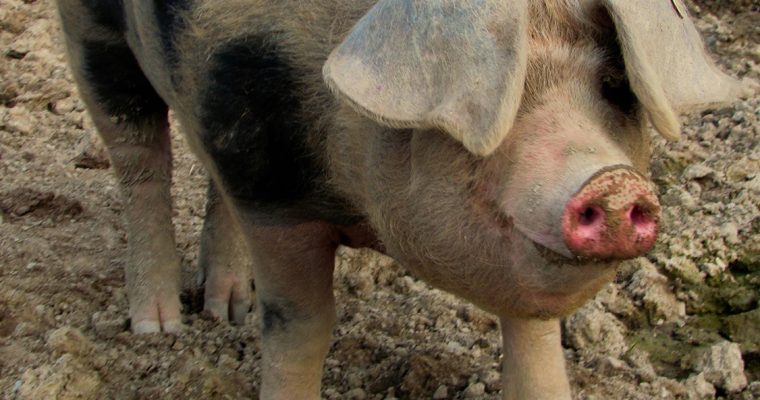The Best of Simple
During my recent post about our visit to White Gate Farm I briefly mentioned that we are trying to live mostly vegetarian, and what our criteria are when we occasionally do eat meat. My friend and guest blogger Renate subscribes to the same philosophy, and recently sent me a very inspiring article from the German news magazine Der Spiegel about just this topic. The celebrity chef interviewed in the article does not mince his words, he is direct and brutal in his attack on industrial food. We need a voice like his to help shape the future of our food systems. Below is my translation of the article (click here to read the original article in German).
From Der Spiegel — Wirtschaft (Economy)
Kitchen God on the War Path
By Michaela Schießl
Gastronomy: Celebrity-Chef Franz Keller squares up with industrial grub and perverted agriculture in a scathing autobiographical diatribe. A meeting with someone who became a farmer out of self-defense.

Franz Keller knows how to make you lose your appetite. “The next time you chew on a piece of tough, cheap meat, think of this: You are chewing the agony of an animal raised and slaughtered barbarically.” Or: “Is your veal cutlet nice and white? That means the animal had an iron deficiency throughout its short, paltry life.”
That’s what it sounds like when a kitchen god is on the warpath. “A celebrity chef attacks,” says the warning on the cover of his book released this spring — the title: The Best of Simplicity: Food is Politics or How I Had to Become a Farmer in Order to Find the Perfect Culinary Delight.
It’s obvious: someone who writes this much on the cover is about to burst. “I had to release some steam,” Franz Keller says, and freely rants against politics and industry, who do not care about the health of their citizens.
The fulmination comes from an authoritative source. Keller apprenticed with legendary French chefs Paul Lacombe, Paul Bocuse and Michel Guérard, and then brought Nouvelle Cuisine to Germany with Eckhart Witzigmann. At times he was the best earning chef in the country, and always one of the best.
The champion sat down at his desk in the evenings for over two years and let his rage flow onto the pages. The result is a juicy manifest: for treating man, environment and animal with respect when manufacturing quality food items — and for the immediate return of all citizens to the stove.
Keller believes that eating has to do with morals, but his book is far from narrow-minded. His trick: He interlaces the topic with his life. Because food dominates his life.
It all began in the family restaurant “Schwarzer Adler (Black Eagle)” in Oberbergen near Freiburg. His mother was the first female chef in Germany to earn a Michelin star, his father, a restaurateur and vintner, smuggled in French wines to spare his guests from drinking sweet German dishwater. During his apprentice years in Lyon the son won the heart of choleric chef of the century Paul Bocuse, and he enjoyed it when late at night Alain Delon or Lino Ventura would show up at Michel Guérard’s restaurant “Pot-au-Feu” in Paris without a reservation and had to wait forever at the champagne bar, because no guest would leave when Alain Delon or Lino Ventura were there. Bocuse drilled into him what he would never forget: A chef is free, independent, and the star in the restaurant. This philosophy fit young Keller just fine.
“A pig that is not allowed to be fat is a poor pig”.

Unfortunately, word had not yet spread to Germany. When he returned home to the “Schwarzer Adler” in 1973, the son earned his second Michelin star, but his heartless and probably also jealous father kept him like a kitchen slave. Secretly, away from his father, junior cooked 60 liters of goulash soup for the demonstrators against the planned nuclear power plant Wyhl — anti-nuclear activists never ate better.
Obviously the competition between the two alpha males escalated. The son almost beat his father to death with a chair. The crack in the table caused by the chair breaking apart on impact is still visible today.
Franz Jr. fled to Italy and learned about the art of taking it easy. In Italy a product didn’t have to be turned a million times and mashed, strained and heated, frozen, pureed, or grated. Italians use good oil, good tomatoes, extraordinary pasta, amazing fish — and that’s it. It was his liberation from the heaviness and strictness of French cuisine.
His first restaurant and bistro in Cologne earned him 2 Michelin stars and taught him the valuable lesson that the time and effort needed to run a star kitchen were not worth it. He gave up.
In 1988 the entrepreneur Max Grundig hired him as the gastro-director for the “Schlosshotel Bühler Höhe“ in Baden-Baden, as well as three additional restaurants, paying him a salary of a half a million Mark per year (about $300,000). Keller quickly earned a Michelin star, but was unhappy with his administrative duties. He defied the owner just once, and was fired. He actually found this consequence impressive.
An offer by the “Kronenschlösschen” brought him to Hattenheim in the Rheingau region. Once again he earned a Michelin star. But in reality he was already fed up with the star circus. Expenses force restaurateurs to compromise, and at some point they serve pepped-up convenience food. Today Keller says: “The orchestration for the guests and the reality in the kitchen get further and further apart in the star circus.”
Compromises never were his thing anyway. He was 43 years old at the time. Time for a radical cut.
In 1993 Keller opened the “Eagle Restaurant” 250 meters from “Kronenschlösschen,” a small restaurant with seating for 60. He wrote to the people in charge of the Michelin Guide that he would no longer participate in the hunt for Michelin stars effective immediately. He notified his 900 regular customers that he only had one motto from here on out: The Best of the Simple. Honest food, without flourish, made from the best basic ingredients, the quality of which he could not only judge, but also control, and ideally produce himself.
In the center: meat, preferably from Charolais cattle. But no matter how hard he tried, optimal product was almost impossible to find. In order to make meat production cost effective, livestock needs to be fattened and slaughtered quickly. Such is the system’s logic. Keller had a hard time accepting that. “One cannot deal with nutrition all day and then overlook the questionable production requirements.” Emaciated dairy cows looking like udders on stilts. Feeder cattle being fattened in tight stalls. Pigs lying in their own excrement unable to move. Chickens falling over because of their overly heavy breasts.
“We treat our production livestock whose meat, protein and energy we live on like dirt. One cannot produce a good and healthy piece of meat under these production conditions. No way,” Keller says. “We have to respect the animals that nourish us.”
A bull named Olympus takes full advantage of his owner’s position. The enormous animal, head and neck as massive as those of a bison, wants to cuddle. The colossus weighing several tons gently leans against the fence, Franz Keller manages to withdraw his hand from the gap in a nick of time. Now he pets Olympus above the neck and the animal snorts languorously.
The Limousin steer shares a pen with about 30 cows and calves. It is Franz Keller’s farm, the “Falkenhof” in Heidenrod, about a half hour drive from Hattenheim. He raises cattle, pigs and poultry here because he cannot buy the quality he wants to have on his plates anywhere.
The elite chef descended from Michelin star heaven, put on his rubber boots and became a farmer, purely in self-defense. He passed the “Adler Wirtschaft (Eagle Tavern)” to his son in 2010 and moved to Falkenhof to produce meat for himself and the restaurant.
And just the way he always wished to. Keller’s cattle live their lives until age 3, when they reach maturity. “Only then their meat is truly ripe,” he says. The cows’ milk belongs to the calves, we do not milk our cows. During the summer the cattle roams on a 30-acre meadow. When a cow’s time comes, another animal travels with her in the trailer to the small slaughterhouse as a comfort measure. After all, the best upbringing doesn’t mean anything if the victim releases large amounts of adrenalin into the meat out of mortal fear. Keller uses every part of the animal, even the hide is tanned. His philosophy includes the re-discovery of a usage cycle.
Keller’s pigs live behind the homestead. They are “Bunte Bentheimer,” a rare breed that stores a lot of fat. This is an exclusion criterion for the industry and a requirement for Keller. “A pig that is not allowed to be fat is a poor pig.” His sows have to have seen two winters. Only then does their meat have the right maturity and texture.
Fat serves as a flavor enhancer, something you learn when you dunk Keller’s bread into the fresh herbed liverwurst being served in his kitchen. On the stove the remainder of a rooster simmers in a Pot-au-Feu; the meat is grey. This is exactly how it is supposed to look if the animal was fully grown, Keller says. But no one knows this anymore. The entire hype around meat only distracts from the basics — how it is raised, and is designed to make average meat expensive, he warns. As an example, attending a 2-week courses certifies participants as a graduate meat-sommelier, and they can now sell meat in a meat-boutique. Or the dry-aged hype, a “transparent marketing idiocy.” You only need to dry-age the meat of old animals, but not that of turbo-fattened critters. Keller even criticizes the famous marbling of Kobe- or Wagyu-Beef. Marbling is a sign of overfeeding, comparable to the production of foie-gras.
Under Keller’s philosophy, meat has become a side dish, the vegetables are the star of the plate. Keller firmly believes that if people would just start to cook again, and taste the difference between a hothouse tomato and one they grew in their own garden, the interest in quality products would follow naturally. As an enticement, he included recipes in his diatribe, so people can start immediately. After all, there is nothing more beguiling than true enjoyment.
But despite all attempts at change you cannot forget what is true and set in stone. For example, potato salad must always be made with stock and never with mayonnaise. Never — not even in Northern Germany. *
*Although I endorse Keller’s powerful words, my family’s potato salad recipe was handed down for generations and it requires mayonnaise! -Sigrun


well written article and very insightful opinion from someone with unparalleled insight into the food industry. Let’s hope his warning is being heard by many. I do believe though that the tide is rapidly turning with more and more people returning to real food.
Well done, Sigrun!